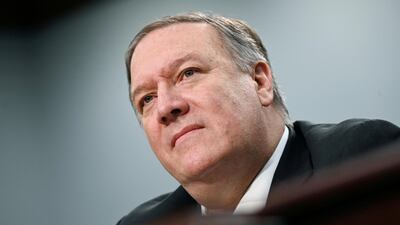Secretary of State Mike Pompeo on Wednesday said the US was abandoning the traditional parameters in mediating the peace process between the Palestinians and Israelis.
Testifying to a House committee, Mr Pompeo expressed optimism when asked about the long-awaited US peace plan for the region, which President Donald Trump called the "deal of the century.”
”I’m very confident that what was tried before failed and I'm optimistic that what we're doing will give us a better likelihood that we'll achieve the outcomes that would be better for both the people of Israel and the Palestinian people,” Mr Pompeo said.
The Trump administration has reversed past approaches to the conflict, abandoning parameters that former presidents Bill Clinton, George W Bush and Barack Obama adhered to in leading negotiations.
Those have centred around questions of borders, refugees, the status of Jerusalem, security and statehood.
But Mr Pompeo blames those boundaries for the failure to achieve peace.
"Those are the parameters that were largely at hand in the discussions before and they led us where we are today, no resolution,” he said. “Decades of trying the old way failed to resolve this conflict."
Instead the Trump administration is seeking to “broaden the debate” Mr Pompeo said.
He said the new approach was based on "the facts on the ground and a realistic assessment of what would get us a good outcome".
The administration has not definitively embraced the two-state solution. It has attributed its decisions to move the US embassy in Israel to Jerusalem and recognise the occupied Golan Heights as Israeli territory to "new facts".
Asked when the Trump peace plan, drafted by advisers Jared Kushner, Jason Greenblatt and David Friedman, might come to fruition, Mr Pompeo answered jokingly: “In less than 20 years".
“We want to make sure we have it as complete and as effective as we know how to do," he said. "When we get there, we’ll unveil it."
The plan is believed to be completed but will be released after the Israeli elections on April 9.
On a recent trip to the region, Mr Kushner and Mr Greenblatt tried to gain Arab support for the economic part of the plan.
The document is expected to tackle the conflict through aspects related to terrorism and security.
Aaron Miller, Middle East programme director at the Wilson Centre, did not share Mr Pompeo’s optimism on the new US approach.
"The goal of the Trump administration from the get-go has been to change the basic elements of the US approach to the Arab-Israeli conflict and to ensure there's no going back," Mr Miller, told The National.
He was involved in Palestinian-Israeli negotiations and served in six US administrations.
Mr Miller said that on issues of “refugees, settlements, borders, Jerusalem and the Golan Heights, they have taken steps to [ensure there's no going back] under the guise of ‘recognising reality’.”
“The chances of ending the Palestinian-Israeli conflict were already slim to none,” he said.
But the US policy changes “will ensure that Donald Trump’s role in any possible resolution will be closed for the season".
US partners in the region, including Saudi Arabia, the UAE, Kuwait, Egypt, Oman, Jordan, Turkey and Bahrain, have rejected Mr Trump’s latest declaration to recognise the Golan Heights as Israeli territory.
Saudi King Salman received Palestinian President Mahmoud Abbas last month and reaffirmed Riyadh’s commitment to achieving a Palestinian state with East Jerusalem as its capital.

